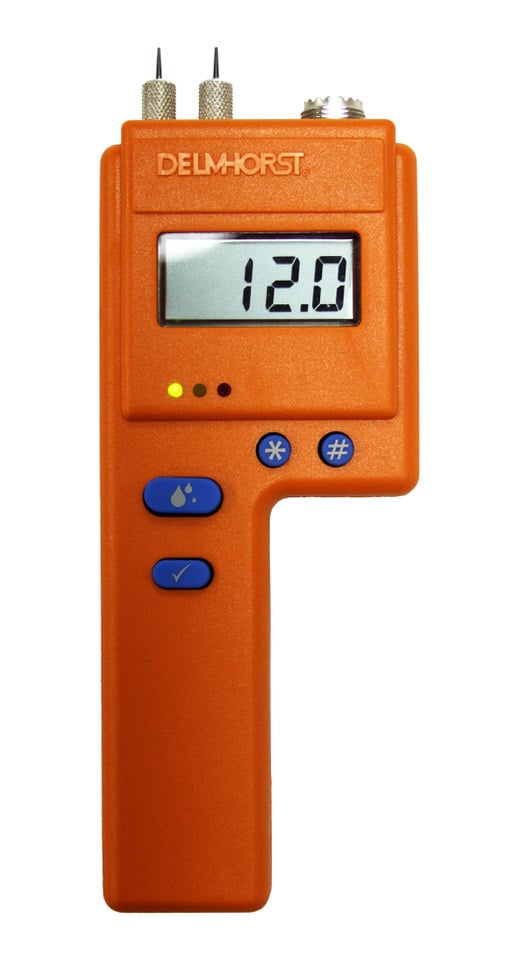Recognizing the Different Sorts Of Moisture Meters and Their Applications
Recognizing the Different Sorts Of Moisture Meters and Their Applications
Blog Article
The Ultimate Overview to Wetness Meters: A Comprehensive Overview and How They Can Save You Money
In the realm of structure upkeep, construction, and various industries, the value of properly measuring dampness levels can not be overstated. Dampness meters act as indispensable tools in discovering and keeping track of moisture content in products, aiding in protecting against costly problems and ensuring the quality of products. Understanding the subtleties of various sorts of wetness meters, their applications, and the potential cost-saving benefits they offer can be a game-changer for experts and services alike. Finding exactly how these devices can not just improve processes but likewise add to monetary savings is a journey worth beginning on.
Sorts Of Dampness Meters
Various sorts of dampness meters are available for different applications in various industries. One typical type is the pin-type dampness meter, which measures the electric resistance in between 2 pins placed right into a product. This kind appropriates for wood, drywall, and various other structure materials. Pinless moisture meters, on the various other hand, usage electromagnetic sensing unit plates to check a larger area without causing damage to the material's surface area. Moisture Meter. These meters are optimal for rapidly assessing dampness levels in big areas such as floors and wall surfaces.

Infrared dampness meters determine the thermal homes of a product to determine its wetness web content non-invasively, making them useful for applications where pin or pinless meters may not be appropriate. Comprehending the different kinds of dampness meters readily available can aid industries pick the most appropriate device for their certain wetness measurement demands.

Advantages of Making Use Of Dampness Meters
Wetness meters supply important advantages in precisely monitoring and assessing moisture levels in diverse materials and environments. One of the primary advantages of making use of dampness meters is the avoidance of potential damage triggered by excess wetness.
Additionally, utilizing dampness meters can lead to enhanced power effectiveness. By recognizing areas with high moisture levels, such as leaks or inadequate insulation, adjustments can be made to improve power preservation and decrease energy expenses. In agricultural setups, moisture meters play an essential duty in maximizing crop returns by allowing farmers to monitor dirt moisture degrees and make informed irrigation choices. On the whole, the benefits of using moisture meters cover across numerous sectors, supplying economical remedies and advertising much better quality assurance techniques.
How to Select the Right Dampness Meter
When selecting a dampness meter, it's important to ensure that the meter is appropriate for the certain product you will be testing. Various products have varying electric buildings that can affect wetness readings, so picking a meter made for your product is critical for accurate results. By thoroughly evaluating these variables, you can pick a moisture meter that fulfills your demands and gives precise wetness measurements for your tasks.
Correct Techniques for Wetness Meter Usage

Cost Savings Via Dampness Meter Applications
How can the critical use of wetness meters lead to significant price financial savings throughout different industries? In the farming industry, dampness meters help in identifying the optimum time for gathering plants, protecting against over-drying or excess dampness that can influence the final item's quality.
In a original site similar way, in building, dampness meters assist prevent pricey damages by discovering moisture levels in structure materials, such as wood or concrete, which can bring about structural issues otherwise addressed promptly. By recognizing issue areas at an early stage, contractors can take restorative actions to avoid substantial fixings or replacements, eventually conserving money why not look here and time.
Additionally, in the food processing sector, dampness meters are important for keeping an eye on item quality and guaranteeing conformity with safety and security regulations. By precisely determining wetness web content in foodstuff, producers can avoid wasting, keep quality, and reduce waste, resulting in significant expense financial savings. On the whole, the tactical application of wetness meters is a beneficial financial investment that can cause significant price decreases and boosted performance throughout different markets.
Final Thought
In final thought, wetness meters are useful devices for identifying and gauging dampness degrees in different materials. By utilizing the best dampness meter and complying with appropriate techniques, users can successfully stop pricey damages caused by excess dampness. Spending in a high quality moisture meter can lead to substantial expense savings in the lengthy run by recognizing prospective issues early on and making it possible for timely remediation. Inevitably, wetness meters are vital instruments for keeping the honesty and durability of structures and products.
Wetness meters offer as crucial tools in identifying and monitoring moisture material in materials, assisting in protecting against expensive damages and ensuring the top quality of products. Infrared moisture meters determine the thermal homes of a material to establish its dampness web content non-invasively, making them valuable for applications where pin or pinless meters may not be appropriate.Wetness meters offer indispensable advantages in precisely checking and examining dampness degrees in varied products and settings. In agricultural settings, wetness meters play a crucial role in maximizing crop returns by enabling farmers to monitor soil dampness degrees and make educated watering choices.In verdict, wetness meters click to read are beneficial devices for measuring and spotting wetness degrees in different products.
Report this page